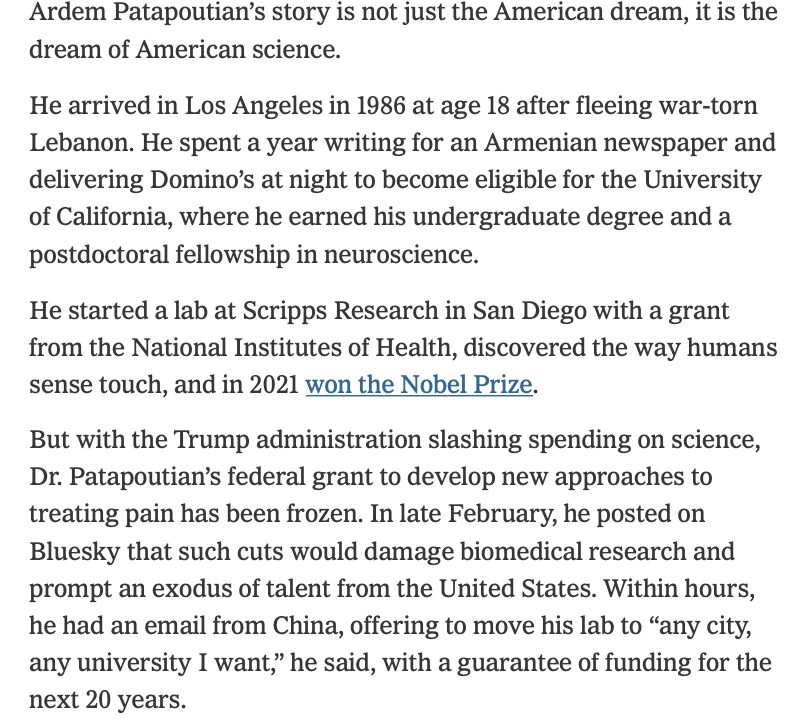Michigan university leaders fight research cuts as feds shift priorities
University of Michigan researchers were beginning to study lifestyle, health and other determinants that could lead to Alzheimer’s disease among Black Americans, who are two to four times more likely to get the disease that has no cure.
The researchers planned a follow-up to a landmark UM study from 25 years ago that included a comprehensive cohort of Blacks across America, along with low-income Whites, as the groups were aging. The goal was to find answers about what steps Blacks can take potentially to avoid Alzheimer's and other dementias, which take a toll on individuals and their families and which the Alzheimer's Association projects cost $360 billion for health and long-term care in 2024, and will reach nearly $1 trillion by 2050.
The study was expected to include 3,000 people, which is three times the size of the largest study ever conducted on Black Americans and dementias, and have answers in five years, said UM epidemiology professor Briana Mezuk.
But in March, the National Institute on Aging sent an email that said the five-year, $13 million federal grant for the study was ended because it "no longer effectuates agency priorities" and referred to it as a diversity, equity and inclusion study. Mezuk has since appealed the decision.
"This problem is not going away, even with the termination of this grant,” said Mezuk, the principal investigator of the study. “When this comes into the lives of Black Americans, either for themselves or their loved ones, it means that when they go to the doctor, the information the doctor is giving them is based on research that does not necessarily reflect their experiences as Black Americans, because the scientific community has not studied this problem in the Black population with large enough samples and with sophisticated enough data to be able to answer questions. Science hasn’t done the research that needs to happen."
The UM grant cut is among scores of university research and development initiatives the federal government has eliminated across the country as the Trump administration has banished diversity, equity and inclusion projects. The administration also has made budget cuts a priority as the nation faces an estimated $1.9 trillion deficit in the next budget year and $36 trillion in overall debt.
The National Institutes of Health defended its change in priorities.
"We remain dedicated to restoring our agency to its tradition of upholding gold-standard, evidence-based science," an NIH spokeswoman said in a statement.
Grant terminations have affected research at Michigan State University, Wayne State University and Eastern Michigan University, along with research between Henry Ford Hospital in Detroit and MSU and the Michigan Department of Health and Human Services.
Michigan universities conducted nearly $3.37 billion in research, of which nearly half, or $1.74 billion, was funded by the federal government during fiscal year 2023, according to an analysis of federal Higher Education Research and Development Survey (HERD) data by Michigan's University Research Corridor.
While early funding cuts by the Trump administration included research pertaining to the gay and transgender community and the U.S. Agency for International Development, the cuts have widened to include targeting research involving racial disparities, energy, humanities and more.
The exact number of research grants terminated by the federal government to Michigan universities is unclear. Some are public, listed in federal online databases. In a survey of the state’s 15 public universities by The Detroit News, some universities did not address the number or value of research grants cut so far, others said they have not been impacted and some did not respond.
Federal cuts to R&D funding in Michigan are a "moving target," said Britany Affolter-Caine, executive director of the Michigan University Research Corridor, an alliance of UM, MSU, Wayne State and Michigan Technological University.
Affolter-Caine said she is concerned because Michigan's research has benefited the state in numerous ways, in addition to the URC's estimated annual economic impact of $24 billion.
“We have all invested in this infrastructure for research over generations,” Affolter-Caine said, “and it feels very much like a dismantling that has benefited our lives in terms of being economically competitive globally, being healthy with all the discoveries in life sciences. There are a multitude of ways in which our lives have been improved as a result of research.”
But others said those facing federal cuts should look to the state.
"Instead of complaining to the federal government, spending interests ought to make their case to state lawmakers," said James Hohman, director of fiscal policy for the Mackinac Center for Public Policy, a Midland-based nonprofit research group promoting free markets and limited government.
"There is little being cut at the federal level that states could not fund if it were a priority. And with their balanced budget requirements, state legislators aren’t inching the country closer to a debt catastrophe."
Grant cuts prompt Michigan responses
U.S. academic spending on research and development reached $108.8 billion in fiscal year 2023, an 11.2% increase from $98.7 billion in fiscal year 2022, according to the HERD Survey. Of that spending, $56.9 billion came from the federal government.
Terminating grants has been explained to some researchers as not in line with new federal policy, including the email sent to the UM researcher and others.
“Research programs based primarily on artificial and non-scientific categories, including amorphous equity objectives, are antithetical to the scientific inquiry, do nothing to expand our knowledge of living systems, provide low returns on investment, and ultimately do not enhance health, lengthen life, or reduce illness," said an email from Michelle G. Bulls, the director of the Office of Policy for Extramural Research Administration at the National Institutes of Health, on behalf Jeni Militano, the acting chief grants management officer at the National Institute on Aging.
"Worse, so-called diversity, equity, and inclusion ('DEI') studies are often used to support unlawful discrimination on the basis of race and other protected characteristics, which harms the health of Americans. Therefore, it is the policy of NIH not to prioritize such research programs.”
The termination of research grant funding has prompted many university leaders to take action, such as appealing decisions, meeting with lawmakers and explaining to the public the impact of research.
The federal research funding cuts also come as universities have been navigating other federal pressures, including work with international students whose visas have been canceled by the Trump administration and threats of other federal aid cuts if universities do not protect Jewish students from antisemitism or engage in DEI efforts. Lawsuits have been filed to attempt to stop the Trump administration's moves, including international student visa revocations and reimbursement cuts to universities for the overhead costs of biomedical research, critical energy, physical sciences and engineering research.
Michigan State University President Kevin Guskiewicz and other university leaders recently traveled to Washington, D.C., and participated in a total of 23 meetings in congressional offices.
MSU also set up a website, Research for You, detailing its work to help people improve their lives, stay healthy and stay competitive around the world. MSU also announced that it is committing $5 million annually over the next three years in a restricted endowment fund for advancing the university's strategic initiatives.
"In this moment, few initiatives are more strategic or more essential in sustaining are research enterprise in protecting our educational opportunities for our students," Guskiewicz said during the April Board of Trustees meeting. "While these funds are not intended to replace lost federal funding and could not fully do so, they represent our deep commitment to MSU's research mission, which continues to improve and save lives."
"Given the fast-moving federal landscape, we will share additional details as we prioritize the most high-impact areas for investment," Guskiewicz continued. "But the message is clear: MSU is standing behind its researchers."
More: UM's Ono warns higher education faces 'a critical moment' after Trump moves
The University of Michigan announced in March a new research funding program in response to federal stop-work orders affecting UM's research, which is the largest university effort in the state and one of the top in the nation.
The program offers a transition plan for managing funding stoppages, relieving the impact on the staff and reducing health and safety risks for research that is underway at the campuses of Ann Arbor, Dearborn, and Flint, along with Michigan Medicine, the university's medical center.
"We stand with you during this challenging moment," UM President Santa Ono and other university leaders wrote in a March 12 letter to the research community. "We hope to offer some clarity about how the University of Michigan will support you and your teams, should federal actions directly impact your work."
A fixed amount of central funding was made available immediately to support salaries, benefits, supplies and other needed direct expenses for up to six months, Ono wrote. While the amount was not immediately available, the UM president wrote that it would be evaluated on a quarterly basis.
"Thank you for your continued commitment to discovery and our collective mission," Ono wrote. "Research at University of Michigan — your research — serves the world and sets the standard ..."
Wayne State has had more than 18 research grants worth more than $10 million that have been terminated by the federal government, WSU Vice President for Research Ezemenari Obasi wrote in a letter last week to faculty and staff.
"These grants supported important work by our WSU faculty, students and staff that advance the health of our community, including interventions for substance use disorders, treatments for cancer and HIV/AIDS, and detection of infectious disease markers in wastewater, among many other important fields of discovery," wrote Obasi, along with several other WSU officials including President Kimberly Andrews Espy.
"These grants also supported the academic and professional development of undergraduate and graduate students who are launching their professional careers. The loss of these funds causes great harm to our university community and undoubtedly hampers the progress of discovery, application and translation for community benefit."
Students and others at Wayne State held a "Kill the Cuts" rally last week on campus to protest the Trump administration's reductions.
WSU is working to appeal grant cuts in the cases where the principal investigator is a Wayne State researcher, the letter said, in addition to other efforts that include Espy meeting with lawmakers in Washington, D.C., and Michigan. But they expected more grant cancellations in the future.
"We have increased our federal and state advocacy to describe the real community impact of grant cancellations and inform legislators and community leaders on the proposed cap that will reduce facilities and administration (F&A) reimbursement from the National Institutes of Health," the letter said.
Obasi said the Association of Public & Land Grant Universities and others are trying to develop "a new F&A funding model" that would be presented to the federal government, with an eye to reduce costs to everyone by eliminating key administrative burdens" to principal investigators and their institutions.
"We look forward to supporting this and other efforts where aligned with Wayne State’s mission and interests," Obasi's letter said.
Other institutions affected
While the Department of Health and Human Services, which includes the National Institutes of Health, finances the largest amount of university research, other federal agencies support research, including the departments of defense, energy and agriculture, along with the National Aeronautics and Space Administration and National Science Foundation.
The majority of research is occurring at the state's top research institutions — UM, MSU, WSU and Michigan Tech University.
But other institutions across Michigan also get federal funding for research, including the Van Andel Institute in Grand Rapids, Western Michigan University, Oakland University, UM Dearborn and private colleges such Hope College, the University of Detroit Mercy and Lawrence Technological University in Southfield.
At Eastern Michigan University, professor of nursing Tsu-Yin Wu lost a five-year NIH grant after less than two years. The grant was for a study examining prevention and intervention around gun violence within the Asian American community.
The research began when a gun shop owner approached the Burma Center, a Battle Creek organization, and told officials that its employees were noticing an increase in firearm ownership by Asian Americans during the pandemic. Burma Center officials had previously worked with the EMU Center for Health Disparities Innovation and Studies and passed on the information, said Wu, the director of the EMU center.
The study was the first to examine why gun ownership is becoming prevalent among Asian Americans, look at the underlying risk and design interventions to prevent injury and mortality, she said.
But the NIH ended the grant in a letter saying it no longer fits with the agency's priorities.
"As we begin to Make America Healthy Again, it's important to prioritize research that directly affects the health of Americans," an NIH spokeswoman said in a statement. "We will leave no stone unturned in identifying the root causes of the chronic disease epidemic as part of our mission to Make America Healthy Again."
Plans are underway for EMU to appeal.
"It’s really unfortunate that people in the community needed this, and they are ready to work with us and now they are left in limbo," Wu said. "We know there are problems that need to be addressed to keep the community safe from firearm violence. ... We are trying to find ways to change people's life expectancy. But it cannot be done right now."
kkozlowski@detroitnews.com
This article originally appeared on The Detroit News: Michigan university leaders fight research cuts as feds shift priorities













